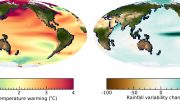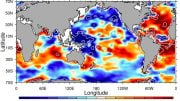
Mediterranean climates are becoming less rainy due to global warming. These climates have hot and dry summers and are sensitive to reduced winter rainfall, making them “hot spots” of climate change.
Mediterranean-type climates face immediate drops in rainfall when greenhouse gases rise, but this could be stopped quickly if emissions are cut.
This is the finding of new research published today in Proceedings of the National Academy of Sciences, which adds to the list of known benefits of rapidly reducing greenhouse gas emissions to keep global heating below 1.5°C.
Decreases in rainfall can impact the water resources of Mediterranean climates, which rely on winter rainfall to supply them through hot, dry summers.
The study, led by the University of Reading in collaboration with the National Research Council of Italy (CNR-ISAC, Bologna) and Imperial College London, reveals new ways in which climate change affects regions characterized by such climates, such as California, central Chile, and the Mediterranean region itself.
Immediate benefit
Previous modeling and observational studies have shown that most Mediterranean climates tend to become less rainy as the planet warms, with the exception of California. Mediterranean climates, which are characterized by hot and dry summers, are known to be particularly sensitive to decreases in wintertime rainfall. As a result, they are often described as ‘hot spots’ of climate change.
However, little was known about how the rate of greenhouse gas concentration increases affects these Mediterranean climates.
Lead author Dr. Giuseppe Zappa, now at the CNR-ISAC, said: “Whenever greenhouse gases are emitted, they immediately begin impacting climate, but the impacts develop over several timescales.” Greenhouse gas build-ups in the atmosphere can affect local climates immediately – on the scale of just a few years – or gradually develop a significant impact over decades or even centuries, like sea-level rise.
Now, the team’s modeling simulations of Mediterranean climates show that decreasing rainfall in the Mediterranean and in central Chile occurs rapidly alongside greenhouse gas rises, on the order of a few years.
According to Dr. Paulo Ceppi, from the Grantham institute – Climate Change and Environment at Imperial: “Our result implies that water resources in these regions would almost immediately benefit from stabilizing greenhouse gas concentrations, since this would interrupt the rapid decrease in rainfall. In other words, climate action is positive not only in the long term, but also after just a few years.”
Answers in the ocean
While California did not see the same rapid decrease in rainfall, the simulations showed that the region would still benefit from a steady increase in rainfall with stabilized emissions in the long term.
Although California is defined as a ‘Mediterranean’ climate, the team says the reason that it responds in a different way to warming than the actual Mediterranean and Chile lies in the ocean.
Dr. Ceppi explains: “The warming of the ocean surface is not uniform, with some regions warming faster than others. The resulting ocean warming pattern affects winds and rainfall globally.
“Those areas of the ocean that warm faster than average cause remote changes in atmospheric winds that make Mediterranean regions drier. By contrast, other ocean areas that warm more slowly tend to make California wetter, while having little impact on rainfall in other Mediterranean regions.”
Reference: “Time-evolving sea-surface warming patterns modulate the climate change response of subtropical precipitation over land” by Giuseppe Zappa, Paulo Ceppi and Theodore G. Shepherd, 18 February 2020, Proceedings of the National Academy of Sciences.
DOI: 10.1073/pnas.1911015117









Be the first to comment on "Greenhouse Gas Changes Immediately Affect Mediterranean Rainfall – ‘Hot Spot’ of Climate Change"